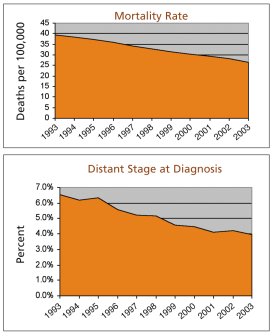Prostate Cancer Death Rate Drops to Lowest Mark Ever
(reprinted courtesy of National Prostate Cancer Coalition)  Prostate cancer death rates dropped 32.5 percent in 10 years, according to new reports, possibly as a result of a dramatic increase in early detection. The mortality rate for African American men is the lowest since 1977, but it is still 2.36 times the rate for Caucasian men.
Prostate cancer death rates dropped 32.5 percent in 10 years, according to new reports, possibly as a result of a dramatic increase in early detection. The mortality rate for African American men is the lowest since 1977, but it is still 2.36 times the rate for Caucasian men.
If the disease is caught early, nearly 100 percent of men are still alive five years after diagnosis, but if the cancer has already spread to a distant location, the five-year survival rate is only 34 percent. Since 1992, the percentage of men with distant prostate cancer at the time of diagnosis has dropped by 75 percent.
The PSA test, introduced in the mid 80’s and developed as a first-line screening test for prostate cancer by Dr. Catalona in 1991, spurred an increase in prostate cancer diagnoses peaking at around 1992. The rapid increase in early detection and subsequent drop in the death rate since 1993 could be attributed to widespread use of the PSA test, adding to the growing body of evidence the PSA test saves lives.
“More lives are being saved every day, through advances in treatment and early detection,” said National Prostate Cancer Coalition CEO Richard N. Atkins, M.D. “It’s important to get active, and tell elected officials to spend more funds on prostate cancer research. Together, we can drop the mortality rate by another 32 percent in a few years.”
(Data from SEER (Surveillance, Epidemiology, and End Results).
(2003 statistics are the most recent available for this data.)









